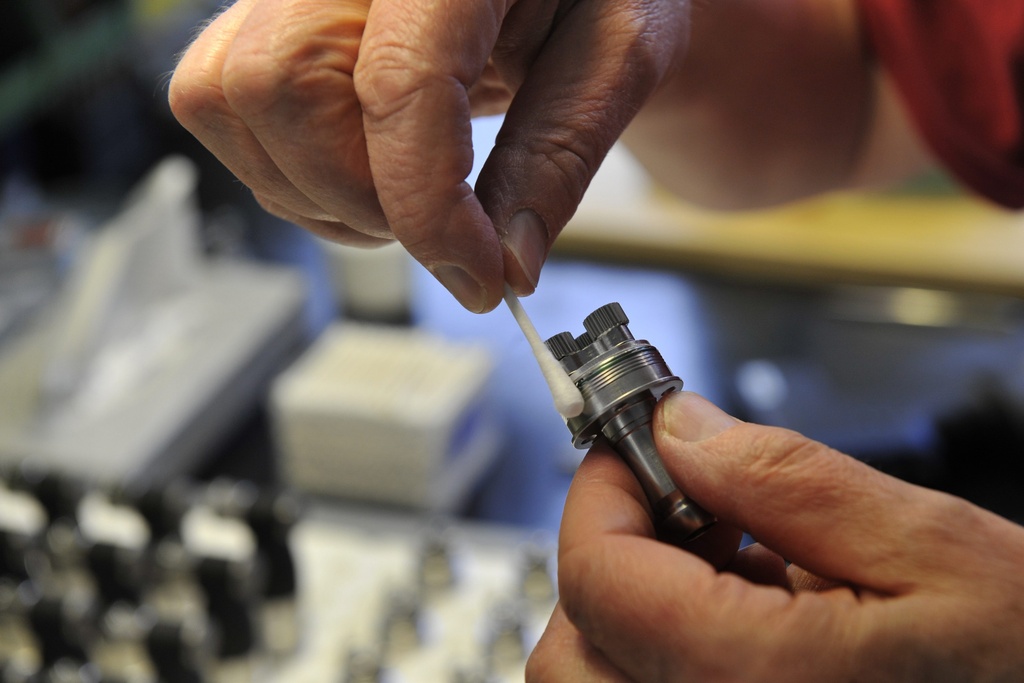
Johnson & Johnson to take over Synthes

In one of the largest healthcare takeovers of recent years, industry giant Johnson & Johnson is to buy Swiss medical device maker Synthes in a $21.3 billion (SFr18.67 billion) deal.
“DePuy [Johnson & Johnson subsidiary] and Synthes together will create the most innovative and comprehensive orthopaedics business in the world,” a joint statement from the two companies said.
A deal had been anticipated after Synthes confirmed last week following rumours that it was in talks with Johnson & Johnson.
Synthes, which posted sales of $3.7 billion (SFr 3.2 billion) in 2010, has carved out a profitable business in the growing market of metal plates, screws, saws and drill bits for orthopaedic surgery. Its products are used around the world to repair bone fractures and deformities.
Life’s work
Multibillionaire chairman of Synthes, Hansjorg Wyss, is already one of the richest men in Switzerland.
Wyss, a graduate of Harvard, owns a 40-per-cent share of the company, and his family’s trust owns a further eight per cent.
He now spends most of his time in the US and has diverted millions of dollars of his fortune to philanthropic causes. He has been described as an old-school style of owner, never taking more than $1 million in pay during his time at the helm of Synthes.
“I am very pleased and excited that my life’s work will continue as part of Johnson & Johnson,” 75-year-old Wyss said in a statement.
Growing markets
With the acquisition, Johnson & Johnson will greatly increase its share of the market for surgical trauma equipment and orthopaedic implants.
“Orthopaedics is a large and growing $37 billion global market and represents an important growth driver for Johnson & Johnson,” CEO Bill Weldon said in a statement.
The New Jersey-based company said it would pay SFr159 for each Synthes share, paying $2 billion in cash and the rest in stock. The price represents a premium of 8.5 per cent on Synthes’ closing share price on Tuesday.
Swiss medtech expert, Professor Gilberto Bestetti told swissinfo.ch Synthes‘ size meant that there were few global companies big enough to pay the price to acquire it. He said an important part of the deal was Johnson & Johnson’s willingness to maintain local research and development activities.
“Johnson and Johnson has not said it wants to dismantle Synthes or sell one part or another. It seems that the integrity of Synthes will be respected, that’s very important,” said Bestetti. “The group has identified the fact that not only research and development, but also production in Switzerland, are particularly good.”
Johnson & Johnson said Synthes would complement its own DePuy orthopaedics portfolio to address what it called “significant market trends”.
These include aging populations and increased rates of obesity, both of which result in greater demand to treat joint disease, it said.
Troubled waters
Synthes is based in West Chester, Pennsylvania, but has its global headquarters in Solothurn in northern Switzerland, and trades on the Zurich exchange.
Both companies have had legal troubles recently. Synthes pleaded guilty last year to a felony and dozens of misdemeanour crimes over unauthorised testing of its bone cement on spinal surgery patients, even though the cement was approved only for use in the arm. Three patients died on the operating table.
Synthes and subsidiary Norian Corp. performed the tests from 2002 to 2004. The companies agreed to pay $23 million in fines.
Johnson & Johnson, meanwhile, has suffered repeated product recalls, resulting in the yearlong closure of a non-prescription medicine factory in Fort Washington.
J&J owns around 250 separate companies under its corporate umbrella. The group attempted to buy US medical device maker Guidant, which specialised in cardiovascular products, several years ago, but was outbid by Boston Scientific Corp.
Medical devices and diagnostics accounted for 40 per cent of J&J’s $61.6 billion in 2010 sales, but the business has been hit by competition and recalls in its hip and knee replacement unit.
J&J employs 3,600 people in at least seven sites in Switzerland out of a global total of 115,000.
Synthes has come a long way from its original roots with the present day company being formed from a merger of different enterprises in Switzerland and the US.
In 1958, Swiss surgeons formed the Association for the Study of Internal Fixation (AO/ASIF) to advance the science of orthopaedic surgery. AO/ASIF teamed up with engineering firm Mathys Medizinaltechnik.
AO/ASIF registered the trademark Synthes two years later, awarding commercial contracts to Mathys and medtech firm Straumann to develop, produce and distribute innovations.
Hansjörg Wyss founded Synthes USA in 1974 while AO/ASIF turned into the AO Foundation in 1984 – the Association for the Study of Osteosynthesis.
Straumann left the alliance by spinning off its orthopaedic interests, which became known as Stratec Medical in 1990. Stratec listed on the Swiss stock exchange in 1996.
Stratec and Synthes USA combined forces in 1999 to form Synthes-Stratec. The merger was completed in 2004 to form the publically listed company Synthes.
Two years later Synthes bought out the intellectual property rights from the commercial arm of the AO Foundation.

In compliance with the JTI standards
More: SWI swissinfo.ch certified by the Journalism Trust Initiative



























You can find an overview of ongoing debates with our journalists here . Please join us!
If you want to start a conversation about a topic raised in this article or want to report factual errors, email us at english@swissinfo.ch.